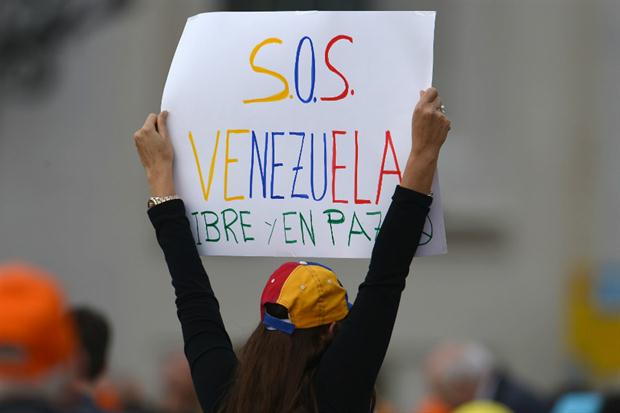
Cubanet, Miriam Celaya, Havana, 4 December 2015 — Next Sunday, December 6, 2015, when the legislative elections in Venezuela finally take place, not only will they be deciding the short-term political fate of that South American nation but also, to some extent, they will be deciding future policies of various nations of this region, whose regimes — especially the Cuban government — have depended for decades on the dilapidation of the huge Venezuelan natural wealth in the hands of the “Bolivarian” claque.
These past few days, there have been several comments about the Venezuelan suffrage in the media, and various predictions have been made about the possible scenarios that might emerge from the results. The picture is complex. For the first time, since the late Hugo Chávez took office in February, 1999 and began to destroy the country’s civic structures, the Unified Socialist Party of Venezuela (PSUV) will go to the polls with a significant disadvantage compared to the opposition’s Democratic Unity Roundtable (MUD) and even below the level of independent candidates, according to data released by surveys conducted by Verobarómetro. This is a reality that the country’s president refuses to accept, threatening not to consent to any result that is adverse, and to lead the country into chaos if the “Bolivarian Revolution” loses at the polls.
On gaining control of parliament, the opposition would face the real possibility of curbing the mismanagement that Chávez initiated that has led the country to economic ruin and deep social tension, and open the door to the hope of restoring democratic order as it becomes a true counterweight to the president, a new order which would balance the forces and return power to the civic institutions guaranteeing democracy
Beyond this, the challenge for the opposition to win social spaces and legitimize its capacity as an alternative to Chavez would only have just begun, given the high rates of poverty, violence, shortages of commodities, growing discontent and the colossal inflation, these factors further complicate the already complex Venezuelan landscape. It will represent a daunting task for any alternative political force in the country in ruins.
Obviously, the first responsibility of the new parliament would be to try to solve Venezuela’s internal crisis, which will necessarily involve the control and comprehensive review of managing the national wealth, the oil, which has been the mainstay of expensively unaffordable social programs (“missions”) with which the Bolivarian government won-over the vote of the masses, and the backbone of ghostly alliances such as the ALBA and Petrocaribe programs, among other regional associations.
The “Venezuela effect” for Cuba
Although the octogenarians hierarchs, architects and sextons of what was once the Cuban Revolution, were once the ideological patrons and material beneficiaries of that other creature with congenital malformations, known as the Bolivarian Revolution, now it is obvious that the Castro regime’s survival goldmine is running out.
Falling oil prices and the waning popularity of the ruling PSUV seriously threaten the continuity of the Castro-Chavista alliance and the undeniable failure of the Cuban system is a fact, not only in Cuba but also in its transnational experiment, Cubazuela.
Not by chance have the crafty former Sierra Maestra guerrillas, shortly after the sterile “seeding” of the commander Chavez, been lobbying a hasty and secret reconciliation with the forever ‘enemy’ (and the enemy of all), the US government. They have also desperately auctioned off the crumbs that remain of this island, to make them available to the once depraved foreign capital, although potential investors have not yet resolutely taken the bait.
Another direction that is being depleted for the olive green gerontocracy is the derivative of the very juicy ‘solidarity industry’, centered around the ‘missions’ developed by Chávez at the cost of hiring, under conditions of semi-slavery, Cuban professionals, mainly from the areas of health, education and culture, which guarantee direct inflows to the Palace of the Revolution. However, this has meant a serious impairment to health care programs for Cubans and it has also brought with it the defection of thousands of doctors, who have chosen to leave for more promising destinations or to be hired in the countries where they worked as “collaborators.”
Everything indicates that the Castro-Chávez alliance strategy of domination of power disguised as socialist and nationalist ideology that temporarily combined, fairly successfully, the experiences of the failed Cuban system, the messianic ambitions of Hugo Chávez and Venezuela hydrocarbon reserves, is about to become another bad memory. It is expected that some other aberrations will be flushed down the drain with the Bolivarian Revolution. These aberrations were equally sustained by the merciless plunder of Venezuelan petrodollars, whose main objective has been spewing the leftist epidemic around the region and dealing with the North American influence in this hemisphere.
Meanwhile, ordinary Cubans are rather indifferent to the important electoral succession about to be held in Venezuela. At best, some express some concern about impending blackouts and paralysis in Cuba. Apparently, mere survival imposes too many problems for them to be interested in those faced by Venezuelans. Immediacy is the most important element of daily life in Cuba, and, currently, the subject of emigration occupies a central place in the musings of the Cuban people.
In any case, in the eventuality that a dramatic change takes place in Venezuela that might have repercussions in deepening the Cuban crisis, most likely the result will be an increase and stepping up in the tide of migration to the United States. In the end, a friend jokes that we might not even have to turn off the lights on the Desert Island when the last Cuban leaves “because, without Maduro, there will be not oil left to generate electricity.” This, literally, is a very somber expectation.
Translated by Norma Whiting
